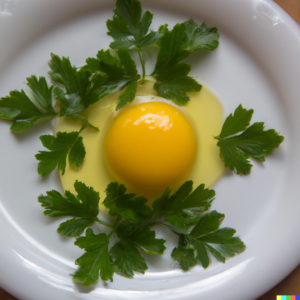Raw eggs have a relatively mild and somewhat bland taste, with the yolk often described as being richer and creamier compared to the white. It also has a slightly viscous texture, while some people may detect a subtle hint of sweetness.
Some may find the taste and texture off-putting, while others may enjoy it.
The taste of a raw egg can vary depending on factors such as the egg’s freshness, the hen’s diet, and even the breed of the chicken.
Fresh eggs from pasture-raised chickens may have a cleaner, more vibrant flavor compared to eggs from caged hens or those that have been sitting in a grocery store for an extended period.
However, it’s important to note that consuming raw eggs carries a risk of foodborne illness, so it’s generally not recommended unless the eggs are pasteurized or used in a dish that’s specifically designed to be consumed raw, such as certain desserts like tiramisu or homemade mayonnaise
To truly understand the taste of a raw egg, one must first consider its components.
An egg consists of two main parts: the egg white (albumen) and the yolk.
These components offer distinct flavors and textures, both individually and when combined.

When raw, the white is translucent and slightly viscous. Its flavor is often described as mild, slightly salty, and with a subtle hint of sweetness.
The texture is smooth and slippery, with a slight gelatinous quality.
The yolk is the star of the show. It has a creamy consistency and a vibrant golden color. Its taste is more pronounced compared to the egg white, and it’s often what distinguishes the overall taste of a raw egg.

When combined, the egg white and yolk create a harmonious balance of flavors and textures.
While some culinary enthusiasts enjoy the taste of raw egg in certain dishes, such as Caesar salad dressing or homemade aioli, others prefer to consume eggs only after they’ve been cooked.
Cooking not only alters the taste and texture of eggs but also eliminates the risk of foodborne illness associated with consuming raw or undercooked eggs, such as salmonella contamination.
-
Is it good to eat a raw egg?
Consuming raw eggs carries the risk of salmonella contamination, which can lead to food poisoning.
While raw eggs are a good source of protein and nutrients, it’s generally not recommended to eat them raw, especially for vulnerable populations like young children, pregnant women, the elderly, and individuals with weakened immune systems.
-
Are raw eggs salty?
Raw eggs themselves are not inherently salty. The taste of raw eggs is often described as mild and somewhat bland, with the yolk having a richer, creamier flavor compared to the white.
However, adding salt to raw eggs can enhance their flavor if desired.
-
3. How do you make raw eggs taste nice?
To make raw eggs more palatable, some people add seasoning like salt or pepper.
Others incorporate raw eggs into recipes where they’re not as noticeable, such as in smoothies, salad dressings, or certain desserts like tiramisu.
Additionally, combining raw eggs with other flavorful ingredients can help improve their taste.
-
What is the taste of egg?
Raw eggs have a relatively mild and somewhat bland taste, with the yolk being richer and creamier compared to the white.
-
Which is better, boiled or raw egg?
Both boiled and raw eggs have their own sets of pros and cons. Boiled eggs are generally safer to consume as they eliminate the risk of salmonella contamination.
However, some people prefer the taste and texture of raw eggs, especially when incorporated into certain dishes. It ultimately depends on personal preference and dietary considerations.
-
Is raw egg good for men?
Raw eggs, like cooked eggs, are a good source of protein and various nutrients such as vitamin B12 and vitamin A. It’s important to weigh the potential benefits against the risks and consider safer alternatives for obtaining these nutrients.
In conclusion, the taste of a raw egg is a unique experience that can vary depending on individual preferences and factors such as freshness and sourcing.



